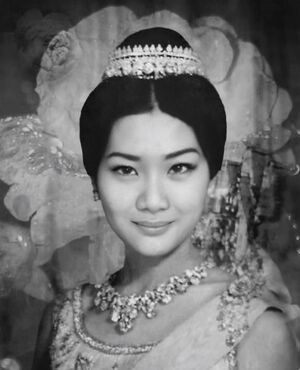User:Belfras/AnulaofAnkat
| Anulā | |||||
|---|---|---|---|---|---|
 | |||||
| Queen of Ankat (more...) | |||||
| Reign | 16 December 1950 – 7 March 1968 (17 years, 2 months, 20 days) | ||||
| Coronation | 20 December 1950 | ||||
| Predecessor | Ravin III | ||||
| Successor | Monarchy abolished | ||||
| Prime Ministers | See list
| ||||
| Born | 5 July 1926 Royal Palace, Nilagne Naegima, Ankat | ||||
| Died | 7 March 1968 (age 41) Royal Palace, Nilagne Naegima, Ankat | ||||
| Spouse | XXXX (m. 1982) | ||||
| Issue |
| ||||
| |||||
| House | House of Vijalanya | ||||
| Father | Ravin III | ||||
| Mother | XXX | ||||
| Religion | Sudu Mārgaya | ||||
Anulā (Terasi:විජාලන්යා ගේ නිවසේ රවීන්ගේ සහ ආර්න්ගේ දියණිය අනුලා, tr; Vijālanyā gē nivasē Ravīngē saha ārngē diyaṇiya Anulā; 5 July 1926 - 7 March 1968) was the last queen of the Royal Kingdom of Ankat and the fifth queen of the country. She ruled from 1950 after her father's death until her death in 1968 during the Ankati Revolution at the outbreak of the Ankati Civil War. Her reign has been subject to many historical debates as documents from her time as queen have largely been destroyed during the sack of the Royal palace shortly after her death. The current government of the Socialist Republic of Ankat has stated and procured documents stating that Queen Anula instigated multiple instances of human rights abuses, with the 1967 Tan Mar Massacre, a widely documented incident between royal forces and protestors in Tan Mar in the months leading up to the revolution being the most widely documented. Despite evidence shown by the socialist government, many commentators insist that the Tan Mar massacre was conducted by overzealous military commanders operating without orders and that other accusations by the socialist government are unfounded, with some pieces of evidence being exposed as fraudulent.
In her life she was often referred to as a modernising influence in the country, frequently visiting neighbouring countries and distant influences in Mutul and Belisaria, following the influence of her father in using positive foreign relations to better the nation. Her internal politics leading up to 1965 are well documented and show a focus toward agricultural and infrastructure development. Commentators in favour of the queen consider her to have been a large influence on social reforms in the cities